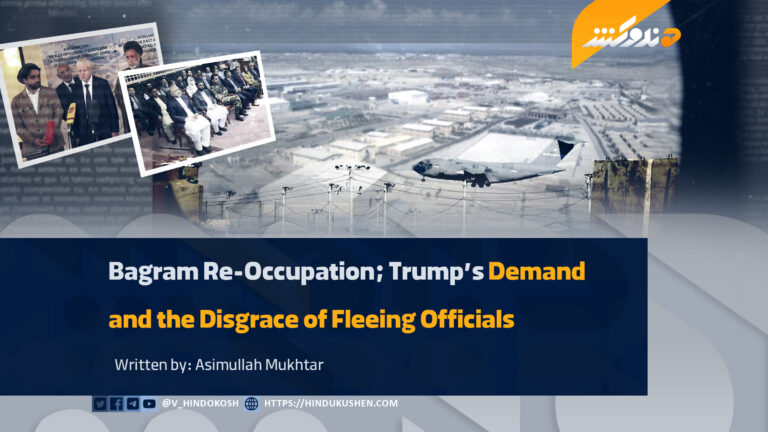Written by: Asimullah Mukhtar
Afghanistan holds a strategic geopolitical position in Asia, connecting Central Asia with South Asia. The country serves as a transit route for Central Asia’s energy resources (oil and gas) to South Asian markets. In addition, Afghanistan is rich in natural resources such as iron, copper, gold, silver, precious stones, lithium, and others. These factors have attracted the attention of major global powers.
During the U.S. occupation from 2001 to 2021, the occupiers used Bagram Airbase as a major military hub. From this base, they conducted military operations across Afghanistan and monitored movements from China, Iran, and Central Asian countries. After the U.S. withdrawal in 2021, Bagram was handed over to the Afghan government. The Afghan government has rejected all reports suggesting that Bagram was handed over to U.S. or Chinese forces.
After winning the presidency, Donald Trump repeatedly mentioned Bagram Airbase, stating that its proximity to China makes it strategically important. According to him, Bagram is only an hour away from China’s nuclear facilities. In response, the Chinese Ministry of Foreign Affairs stated that China is committed to Afghanistan’s territorial integrity and does not support actions that increase regional tensions. Trump, however, insisted that if Afghanistan does not hand over the base to the U.S., undesirable events could occur.
The Afghan government has taken a clear and firm stance regarding Bagram. According to the Foreign Minister, the government does not engage even in discussions about Bagram with any party. He stated, “Anyone who has been defeated in Afghanistan will not have the courage to return; the British came and their empire became Britain, the Soviets came and their empire collapsed, Russia emerged from it, and the Americans and their allies, even within their own homes, face many difficulties. No one dares to invade Afghanistan, and if they do, the outcome is predictable.”
Considering Afghanistan’s history and the Afghan government’s firm position, Trump’s statements are purely political pressure and campaign rhetoric. Trump will never make the mistake of a military invasion of Afghanistan. In response to Trump’s remarks, several political analysts commented. Former senior White House official Lisa Curtis stated that the Taliban would never allow U.S. forces to occupy Bagram. According to her, “The Taliban fought the U.S. and NATO forces for twenty years to expel foreign troops from Afghanistan.”
Security expert Abdul Sayed said, “For the Emirate, handing Bagram over to U.S. forces is a matter of life or death; considering their religious beliefs and Afghanistan’s history, this is politically fatal, and they cannot tolerate it under any circumstances.”
Sayed told TRT World that the statements of Afghan officials and reactions from their supporters on social media show that they consider Trump’s demand as political pressure rather than a genuine proposal. Trump’s real demand is not sincere; it is merely a tool to secure other concessions and privileges.
Analysts argue that Trump has a mistaken understanding of Afghanistan; he misinterprets the realities on the ground. Meanwhile, some fleeing corrupt officials of the former republic—like Dostum, Ibrahim Al-Koozi, so-called resistance figures, and others—support Trump’s statements, motivated by personal interests, even ready to sell Afghan territory or engage in deals. However, their statements and support are of no benefit. These discredited figures have already been exposed and rejected by the people. Fleeing corrupt officials must abandon any thoughts of occupation or deals over Bagram. The Afghan faithful nation and mujahideen (holy fighters) fought for twenty years to end the occupation and establish a pure Islamic system.
Note: The articles, essays, and comments published by the Voice of Hindukush only reflect the views of the authors & writers and do not necessarily represent the agreement of the Voice of Hindukush.




